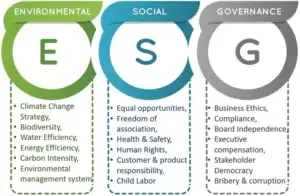ESG Explained: Driving Environmental Change Through Responsible Business
ESG:
Environmental, Social, and Governance is not just a business buzzword — it’s a powerful approach to help companies grow responsibly while protecting our planet. For people and businesses across India, understanding ESG, especially its environmental focus, is key to building a cleaner, healthier, and more sustainable future.
In this blog, we explain Environment, Social & Governance simply, highlight why it matters in India, and show how everyone can contribute to positive change.
What Exactly is ESG?
ESG stands for three important areas businesses must manage carefully:
-
Environmental: How a company impacts nature — things like pollution, energy use, and waste management.
-
Social: How a company treats its people — employees, customers, and communities.
-
Governance: How a company is managed with fairness, transparency, and accountability.
Here, we focus mostly on the Environmental part, which is vital for India’s well-being.

Why Should India Pay Attention to ESG?
-
Serious Environmental Challenges: India struggles with air and water pollution, waste management, and natural resource depletion. It encourages businesses to reduce these harms.
-
Attracting Investment: Global investors prefer companies with strong Environmental, Social, and Governance practices, opening doors for Indian firms to grow.
-
Stricter Laws: Indian government is tightening environmental regulations to protect health and nature.
-
Balancing Growth and Nature: Its helps India develop economically without sacrificing the environment.
Key Environmental Areas Indian Companies Must Focus On
-
Pollution Control
Follow standards set by authorities like the Central Pollution Control Board (CPCB) and Gujarat Pollution Control Board (GPCB) to reduce harmful emissions and effluents. -
Waste Management
Proper segregation, recycling, and disposal of waste as mandated by government rules help reduce pollution. -
Energy Efficiency & Renewable Energy
Switch to clean energy sources like solar and wind to cut carbon emissions and save costs. -
Water Conservation
Use rainwater harvesting, wastewater recycling, and efficient water use to tackle scarcity. -
Biodiversity Protection
Preserve forests, wildlife, and natural habitats under Indian environmental laws for ecological balance.
For more details, visit: Ministry of Environment, Forest and Climate Change (MoEFCC)
The Role of Circular Economy in ESG
A circular economy means reusing, recycling, and reducing waste instead of the traditional “take-make-dispose” model. Its encourages companies to adopt circular practices to minimize environmental damage. For example, manufacturers can use recycled materials and design products for easier recycling at the end of their life. This not only conserves natural resources but also reduces landfill waste and pollution.
That’s Impact on Water Stewardship
Water scarcity affects many regions, making water management a critical part of ESG. Companies practicing good water stewardship focus on reducing water use, treating wastewater before release, and protecting water sources. By conserving and managing water responsibly, businesses ensure this precious resource is available for communities and nature alike.
Environmental Education and Awareness through Environmental, Social, and Governance
ESG also promotes education and awareness about environmental responsibility. Companies can train employees, engage communities, and support environmental initiatives. This creates a culture of sustainability that goes beyond compliance, inspiring long-term positive change.
How Can Businesses Adopt ESG Practices?
-
Conduct Environmental Impact Assessments (EIA) before starting projects to identify and minimize environmental risks.
-
Invest in Cleaner Technologies that reduce energy use and pollution.
-
Develop Clear Environmental Policies aligned with Indian regulations and global sustainability goals.
-
Monitor and Report Performance transparently to build trust with customers, investors, and communities.
Benefits of ESG for India and Its People
-
Cleaner air and water leading to better public health.
-
Sustainable use of resources protecting nature for future generations.
-
Attracting global investments supporting business growth.
-
Enhancing India’s image as a responsible and progressive nation on the world stage.
How Can You Contribute to ESG as an Individual?
-
Choose products and services from companies committed to Environmental, Social, and Governance principles.
-
Reduce your own energy and water consumption.
-
Participate in community efforts to plant trees, clean up local areas, and promote recycling.
For more details, visit: Central Pollution Control Board
